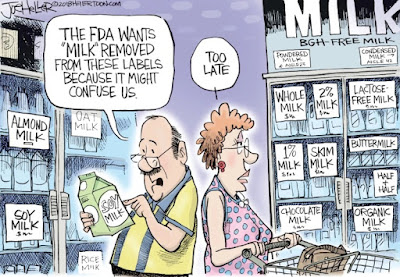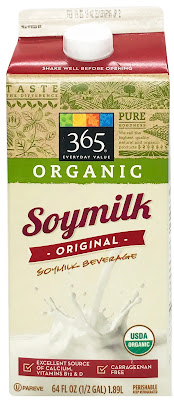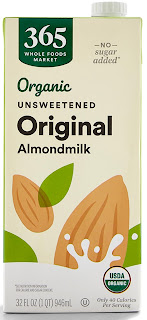The US Food and Drug Administration (FDA) has recently announced that they will not object to the word “milk” in product names like coconut milk, soy milk, almond milk, oat milk, and other plant-based beverages. Evidently, the FDA experts think consumers are smart enough to know that these aren’t dairy products, and the public isn’t going to be confusing them with dairy milk. This seems very obvious to me as these products aren’t new at all — they’ve been in use and called “milk” for centuries! The problem isn’t with consumers, it’s with the powerful dairy industry that hopes to regain a market share that they enjoyed for several decades — but this hasn’t been true forever!
A number of historic discussions recently have been pointing out that in fact, almond milk has been made and used for nearly 1000 years. And soy milk was invented even before that in China, and has been in use in the US for well over a century. Oat milk only dates back a few decades. But the use of the word “milk” for any milky liquid whether from a plant or from animal milk is not new in the least. The dispute over the commercial use of the word “milk” isn’t even new: it’s come up before with the FDA and the milk producers.
Outside the discussion of plant-based milk, there’s another possibility on the way: lab-generated milk proteins and enzymes. Products made from such vegetarian but chemically identical substances are already on the market, competing with both dairy milk and with plant-based milk.
According to the Washington Post:
“Dozens of companies have sprouted up in recent months to develop milk proteins made by yeasts or fungi,…. The companies’ products are already on store shelves in the form of yogurt, cheese and ice cream, often labeled ‘animal-free.’”
Journalists and Peevers “Protect” the Word Milk
I can’t fault the dairy industry for trying to hold onto their customers (even the ones who are lactose intolerant). But the milk of human kindness runs cold in my veins when it comes to really careless journalists that claim that the word “milk” has always meant only cow’s milk: not even goat’s milk! Lovingly, these self-satisfied boobs describe how they are utterly peeved to hear a customer in Starbucks ordering a coffee with “oat milk”! Or “soy latte.”From SECONDS Food History:
From Atlas Obscura:
“Almonds have been central to Mediterranean and Middle Eastern cuisines as far back as the Roman era, yet almond milk is likely a religiously-motivated, European innovation. The first mention of almond milk appears in a medical context in 12th century Salerno, but it quickly spread from the Mediterranean as far as Germany, England, and Denmark. During Lent, European Christians were barred from consuming milk, as well as eggs and meat. So they needed a substitute….“Animal milks were typically destined for cheese and butter production, not drinking, thanks to a lack of refrigeration. One could make a faux butter by combining almond milk, salt, sugar, and vinegar and straining the result, even if it sounds like a far cry from today’s almond butter (or real butter).”
Nutritionist Marion Nestle on "What this is about"
"Simple. The dairy industry does not like concoctions made from soy, almonds, cashews, macadamias, oats, peas, or other such plants to get to be called 'milk.' It argues that they are not as nutritious as milk and will confuse consumers into thinking they are the same. Most surveys show that the public understands the difference quite well and has reasons for choosing plant-based alternatives that may or may not have anything to do with nutrient contents (think: animal welfare, dairy fat, environmental protection, industrial production, or what have you)....
"For the record, I like dairy products. But the dairy industry is a mess (overproduced, increasingly consolidated, fighting public health and animal welfare concerns) and needs to get its act together. The FDA is not helping it get there with this decision"
 |
Cartoon by Joe Heller |
I wonder if the linguistic and food-history ignoramuses will come after creamed corn next: after all, the white liquid in the can, sometimes called “corn milk,” came out of the corn cob and kernels not from the cream-top of a pail of cow’s milk. What about tiger’s milk? “Leche de tigre, literally ‘tiger’s milk,’ is the citrus-based, spicy marinade used to cure the fish in classic Peruvian ceviche.”
What about shaving cream? Face cream? Will they condemn a monarch butterfly for loving milkweed with its white liquid sap?
Maybe a clown will throw a pie shell filled with Cool Whip in their faces.
Shared with Elizabeth’s Tuesday blog party.
Text © 2023 mae sander. Images from product ads.






18 comments:
I have been using Almond milk and my hubby uses 2% regular milk. Some people just can not handle the dairy products. Take care, have a wonderful week!
It is interesting that there is such a controversy about the word milk. I don't know anyone who does not know the difference between dairy milk vs. any plant based milk.
I'm totally in agreement with you about the long-standing historical uses of the word, "milk." Ditto on the dairy industry's machinations and ridiculous insistence on protecting the "milk" brand. Ditto, too, on my gratefulness for the range of non-dairy options.
That said, now that these products are frequently mixed together within the same case, and given the packaging for these products is often very similar, I sometimes wish for more distinction (or at least distance) between these products. Can't tell you how often I've picked up the wrong thing and only realized it when I finally made it to the cash register!
I have never understood this controversy. It is so clear what both milks are if you just use your brain cells (which too many people of course don't). I'm glad I can drink dairy milk and have done so all my life.
I don't like milk as I can't have dairy.
Happy Tea Day,
Kate
I'd heard about this milk debate and labeling questions, but I still really enjoyed reading this Mae. I'm a cow dairy person, and even throw in some goat cheese, but I certainly don't get confused with almond, soy or oat milk. Have a great T day Mae. hugs-Erika
I'm still laughing over this lovely post, Mae. I'll join the clown in throwing a pie shell with disgusting cool whip at the guy "drinking" tiger milk.
My friend Sally drinks 1% milk that I call "blue water." I would rather drink soy milk than her blue water. I can't believe some people make such a big deal out of plant based milk vs. cows milk. This is a great read for T this Tuesday, dear Mae.
This milk debate is quite interesting and unnecessary too 😀
Here it is "hip" to buy these sorts of milk and hence they are overly expensive.
I´m glad I have no issues with cow milk, but if you do... plenty of alternatives, why not. I use coconut milk since before the other products roamed the market and these days it´s preferably young, rich kids who scream they live vegan. Bite my butt, kids, it´s nothing new, I want to yell at them!
Very interesting, Mae. I am open to all the new stuff if it can produce the same basic taste I have loved for 60 years, doesn't alter my cooking results, and doesn't cost extra.
This whole situation is similar to the situation with so many things our government has decided to dabble in. Messy.
Happy T-day and hugz
I'm sure that people know the difference. But as you know someone always has to make a big deal over everything. Yes, the dairy industry wants to keep their customers, but a single word isn't going to change that. Anyway, I don't think it will. I really enjoyed this post. So much good information. Have a great day today.
Maybe if the dairy industry just worked on saving their own industry instead of trying to confuse the consumer they would find some happiness :) We've used all the milks and dairy isn't our favorite.
This was a very interesting article. I've recently switched to almond or coconut milk and yogurts made from these as cow's milk and products have been causing issues with me.
Another debate we don't need, it's the same here. Have a happy T Day and a great week, hugs, Valerie
Another debate that they waste our time with.. Drink what you want.. Hubs and i drink regular ole' 1% cows milk.. Never touch a plant base milk and don't plan to.. Happy T day dear Mae! And as always thanks for the info! Hugs! deb
You make good points. I'm enjoying Almond Milk quite a bit these days. I use it for smoothies.
Our daughter has to drink almond milk. We tried it and didn't like it. Happy T day.
Supermarkets now have such an array of milks. We drink mainly semi-skimmed fresh milk but when we go away buy a long life version to come home to. Not so keen on Soya milk but, having been given hazelnut milk in coffee once by a friend we do buy that occasionally. In the end milk is whatever you want it to be and for those with dairy allergies there are plenty to choose from.
A brilliant post Mae! Belated Happy T Day, Chrisx
Post a Comment